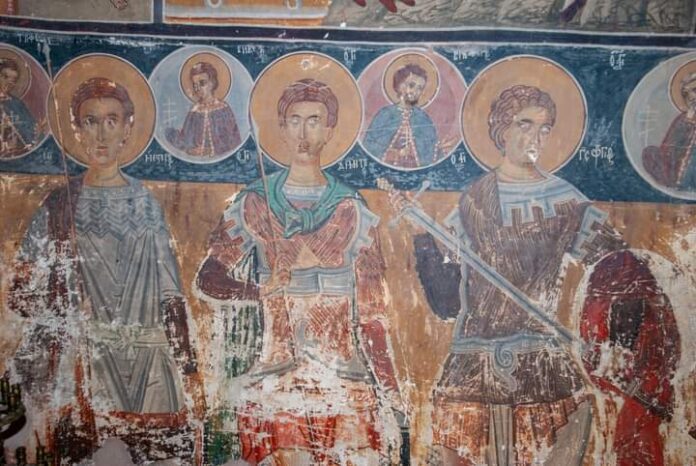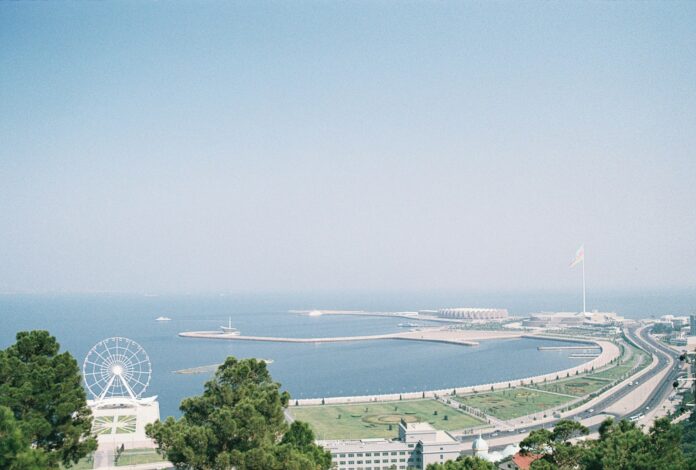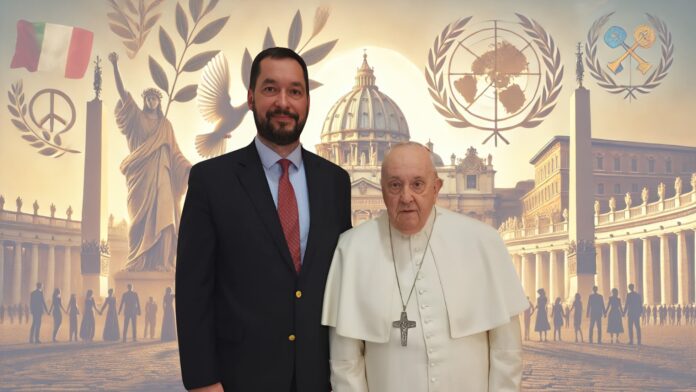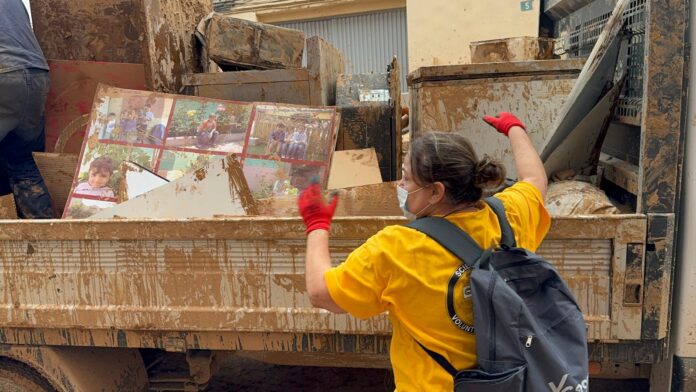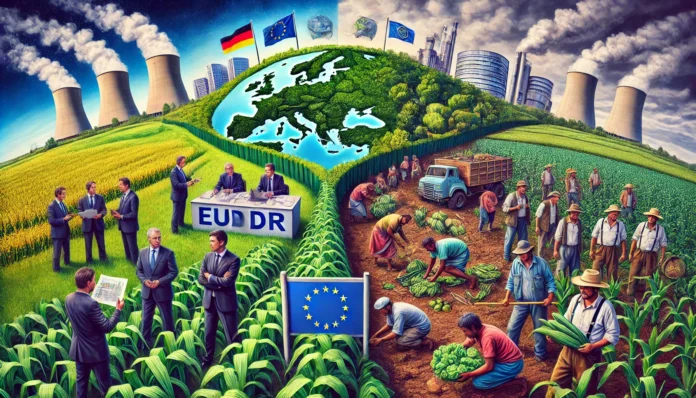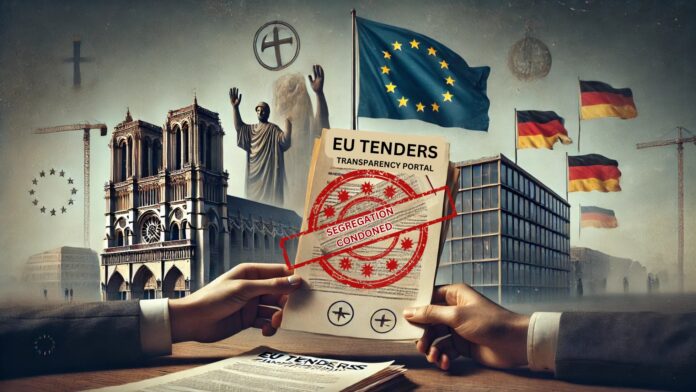By prof. A.P. Lopukhin
Acts of the Apostles, chapter 10. The centurion Cornelius, the appearance of the angel, his ambassadorship to Peter (1-8). Peter’s vision and his meeting with the messengers of Cornelius (9-22). Peter’s journey to Cornelius, preaching in his house, the descent of the Holy Spirit on the hearers and their baptism (23-48)
Acts. 10:1. There was in Caesarea a man named Cornelius, a centurion of a regiment called Italian,
“in Caesarea.” See for this city the interpretation to Acts. 8:40.
“of a regiment called Italian.” This regiment consisted really of Italians, not of soldiers recruited from the natives. Caesarea was the residence of the Roman procurators of Palestine, and therefore they had a special regiment of natural Romans or Italians, as more reliable and skilful warriors. It is probable that Cornelius, the centurion of this regiment, was also a natural Roman or Italian. He was not even a Jewish proselyte, but a Gentile with a good soul and natural piety (cf. Acts 10:28, 34 and before that Acts 10:11, 1, 18, 15:7). The incorporation of such a person into the Church of Christ, and that directly, without any mediation on the part of the Jews, even in the form of proselytism at the gate, is an event of great importance, an epoch in the history of the apostolic Church.
This particular importance of the event of the first conversion of a pagan to Christ also speaks of the fact that it took place through the mediation of the first apostle of Christ – Peter, who was deliberately called by God from another city, although at that time in Caesarea there was the famous evangelist and baptizer of the Ethiopian noble Philip.
Acts. 10:2. a pious and God-fearing man with all his household; he gave many alms to the people and always prayed to God.
“God-fearing … and always prayed to God.” These words show that Cornelius was a worshiper of the One true God, of whom he had probably learned from intercourse with the Jews and their worship, but who worshiped Him in his own way, as his pious heart prompted him, independently and independently of the forms of Jewish worship. worship.
Acts. 10:3. About the ninth hour of the day, he clearly saw in a vision an Angel of God, who came to him and said to him: Cornelius!
“saw clearly in a vision” – εἶδεν ἐν ὁράματι φανερῶς. In the Slavic translation: “saw in visions appeared”. This means that the vision was in a waking state, not in a dream (St. John Chrysostom). It happened about the ninth hour of the day (corresponding to 3:00 p.m.), which was the usual time for prayer among the Jews. Cornelius also prayed at this time, having fasted until that hour (Acts 10:30).
Acts. 10:4. And he looked at him and fearfully said: what, Lord? The angel answered him: your prayers and your alms have gone up as a memorial before God.
“scared”. St. John Chrysostom explains this fear to Cornelius as follows: “The vision created fear in him, but a moderate fear, so that it only made him cautious. The angel’s words dispelled this fear, or more precisely, the praise contained in them softened the unpleasant feeling of fear…”.
“went up as a memorial to God” – a human description of God’s favor to Cornelius because of his prayers and good works.
Acts. 10:5. And now, send men to Joppa and call Simon, who is called Peter:
Acts. 10:6. he is on a visit to a certain Simona, whose house is by the sea; he will tell you words by which you and all your household will be saved.
“he will speak words to you by which you and all your household will be saved.” In the Slavic translation: “he speaks to you, you and your entire home will be saved in them.” However, the Greek text is quite different: “οὗτος λαλήσει σοι τί σε δεῖ ποιεῖν”, which means: he will tell you what to do.
With this vision, the Lord discovered that good works and piety are not enough by themselves – they must be sanctified through faith in the Savior Christ, which gives value and foundation to the good disposition of man.
Acts. 10:7. When the Angel who had spoken to him had departed, Cornelius called two of his servants and a pious soldier from among those who were constantly with him,
“two of his servants” – δύο τῶν οἰκετῶν αὐτοῦ. Literally, it means “his household,” that is, people who are closer to the master of the house than ordinary servants. They were distinguished by the same piety as Cornelius himself (Acts 10:2).
Acts. 10:8. and, having told them all, sent them to Joppa.
“told them all.” The purpose of the servants is to persuade Peter to go with them to their master (Acts 10:22). Blessed Theophylact writes: “He told them everything in order to persuade Peter to come to him, because he considered it indecent to call him to him because of his authority (of a centurion).”
Acts. 10:9. The next day, as they were traveling and approaching the city, Peter, about the sixth hour, went up on the flat roof of the house to pray.
“The next day … about six o’clock.” The distance from Caesarea to Joppa is about 40-45 versts (1 verst – 1066.8 m.). Those sent by Cornelius after the ninth hour (after 3 p.m., Acts 10:3) probably left the same day in the evening. So they could arrive in Joppa the next day at noon (about six o’clock).
“went up to the flat roof of the house to pray.” The flat roofs of houses in the East are very comfortable places for prayer. This is where Peter also goes up to pray at the appointed hour.
Acts. 10:10. And being hungry, he asked to eat; while they were preparing him, he drifted off,
“he came into rapture” – ἐπέπεσεν ἐπ᾿ αὐτὸν ἔκστασις (lit. fell into ecstasy). In the Slavic translation: “horror struck me”. According to Blessed Theophylact, this is a state in which “a person has no control over his senses, being drawn into the spiritual world.” Saint John Chrysostom writes the same.
Acts. 10:11. and – he sees heaven opened, and a vessel descending to him, as it were a great cloth tied at the four ends and let down to the earth;
Acts. 10:12. in it were all the quadrupeds of the earth, beasts, creeping things, and birds of the air.
“in it were all the quadrupeds of the earth” – πάντα τὰ τετράποδα τῆς γῆς. Literally: all the four-legged creatures of the earth. In the Slavic translation: “all four-legged land”. As one interpreter justly remarks, “This contemplation cannot be measured humanly, for the ecstasy gave Peter other eyes…”.
Acts. 10:13. And a voice was heard to him: get up, Peter, slaughter and eat!
“get up, Peter” – ἀναστάς, Πέτρε, θῦσον καὶ φάγε. In the Slavic translation: rise up Petre, slaughter and eat! The participle ἀναστάς is used, which here means incitement to the action commanded, as in Acts. 9:11, 39 and elsewhere.
“slaughter and eat”. The vision accommodates the hunger experienced by Peter at that moment, and suggests the most ordinary preparation of food, but with unusual consumption.
Acts. 10:14. And Peter said: No, Lord, for I have never eaten anything unclean or unclean.
Although in the descending cloth Peter may find clean animals to be eaten, yet he answers the invitation with a definite negative – μηδαμῶς, Κύριες· Literally: “by no means, Lord!” He answers in this way because of the unusual for he indifference with which the voice treats the unclean animals prohibited for use according to the law, and it is precisely them that he has in mind.
“Lord.” Since the voice came from the open sky, Peter answered it with the usual address “Lord!”, feeling in his heart that the vision came from the Lord Jesus Christ.
The meaning and purpose of this vision is as follows: all the animals in the canvas symbolically represent all mankind: the clean animals mean the Jewish people, and the unclean animals the Gentiles. With the death of Christ the Savior on the Cross, as a sacrifice to God, offered for the whole world, purification is given to all, not only to the Jews, but also to the Gentiles, who together must enter the Church of Christ, into the kingdom of the Messiah, alien to every vice and defilement, being washed and continually washed by the blood of the Lamb of God.
Acts. 10:15. And again a voice came to him: what God has cleansed, you do not consider unclean.
It is also understood that the purification of the Gentiles and their entry into the Church of Christ did not require the mediation of Jewish external rites and regulations, which for Judaism itself had a temporary and transitory character. The right of this entrance is given only because of the all-encompassing significance of the sacrifice of God’s Son on the Cross.
Acts. 10:16. This happened three times, and the judgment went up to heaven again.
“It shall be three times.” I.e. the vision, the conversation with Peter was repeated three times, as a sign of the undoubted truth of what was seen and heard, and to assure Peter of the immutability of the Divine decision.
“and the judgment went up again to heaven.” In the pure and holy realm, where even the impure is made pure and preserved as such by God, together with that which has always been pure.
Acts. 10:17. And when Peter was at a loss as to what the vision which he saw meant, behold, the men sent by Cornelia, inquiring about Simon’s house, stopped at the door
“Peter was perplexed.” Peter does not immediately realize what this vision means, but further events explain it.
Acts. 10:18. and, having called one, they asked: Is Simon, who is called Peter, staying here?
“they called one, they asked”. It is not clear from the narrative whether Peter heard this exclamation. It is further said that the Holy Spirit, through a new inner revelation, communicated to him the messengers of Cornelius.
Acts. 10:19. And while Peter was thinking about the vision, the Spirit said to him: behold, three people are looking for you.
Acts. 10:20. Get up, get down, and go with them without the least hesitation; for I sent them.
“Arise, come down, and go with them” – ἀναστὰς κατάβηθι καὶ πορεύου. See the interpretation on Acts. 10:13.
“without hesitating in the least” – μηδὲν διακρινόμενος. That means without any hesitation. Was this prescient warning given in view of the well-known strict views of the apostle, which must have put him in difficulty whether to follow the invitation to go to Gentiles, with whom intercourse was forbidden by the Jewish law (Acts 10:28)?
Acts. 10:21. When he went down to the men sent by Cornelius to him, Peter said: I am the one you are looking for; what job did you come for?
“for what business did you come?” In the Russian translation (“For what purpose did you come?”) again, an inaccuracy was admitted, as the Slavic translation is closer to the original: “kaya есть vina, ее же ради приидосте?”. In Greek: τίς ἡ αἰτία δι᾿ ἣν πάρεστε; That is, the literal translation is: What is the reason why you have come?
Acts. 10:22. And they answered: the centurion Cornelius, a virtuous and God-fearing man, with a good name among all the Jewish people, received a revelation from a holy angel to call you to his house and listen to your speeches.
“with a good name among all the Jewish people.” From these words, it becomes clear that a large part of Cornelius’ benefactions were precisely among the Jews, who in this respect resembled the other famous evangelical centurion – the one from Capernaum.
“to listen to your speeches” – ἀκοῦσαι ῥήματα παρὰ σοῦ. I.e. to hear your words, your sermon, which should teach me what I need to do for my salvation.
Acts. 10:23. Then Peter invited them in and gave them a feast. And the next day he arose and went with them; and some of the Joppian brothers went with him.
“some of the brothers of Joppa” – i.e. of the believers at Joppa, who were six, as appears from the further account (Acts 11:12).
Peter entertained the messengers of Cornelius, and as they needed rest, they did not set out until the next day, and probably not very early. They did not arrive at Caesarea until the next day, the fourth day after the vision received by Cornelius (Acts 10:30).
Acts. 10:24. The next day they entered Caesarea. And Cornelius was waiting for them, having summoned his relatives and close friends.
“had called together his relatives and close friends”, who were quite a large group of people (Acts 10:27), of one mind with Cornelius and ready with him to believe in Christ according to the word of Peter. It was the first community of pure pagans to join Christianity without the mediation of Jewish cultic institutions.
Acts. 10:25. As Peter entered, Cornelius met him, fell at his feet, and worshiped him.
Acts. 10:26. And Peter lifted him up and said: get up, I am also a man!
Peter refused Cornelius’s obeisance, not only out of humility, but because he felt in this act that Cornelius was honoring him as some embodiment of a higher power, which was so characteristic of the heathen conception of gods in human form (Acts 14:11).
Acts. 10:27. And conversing with him, he entered and found many assembled.
Acts. 10:28. And he said to them: you know that it is not forgiven for a Jew to gather or get close to another tribe; but God revealed to me not to consider any person dirty or impure.
There is no prohibition in the Mosaic Law for a Jew to communicate with foreigners (Gentiles); it is the petty severity of the later rabbinate, which, under the influence of Pharisaism, developed the idea of the holiness of the chosen people to an excessive degree.
Thanks to the well-known influence of the Pharisaic teachings on the people, this view of relations with the pagans immediately acquired the meaning of a general custom and a firmly established rule – a law, which was also reflected in the way of action of the first supreme apostle.
“not to consider any person dirty or impure” – in the sense of the above-mentioned Pharisaic views, as the impossibility of a pagan to be purified and sanctified through faith in Christ, regardless of Judaism.
Acts. 10:29. Therefore, being invited, I came without objection. Now, I ask, on what business did you send for me?
“on what errand didst thou send for me.” Peter already knew in part what the purpose of his coming was. But now he wants to hear this once more from the mouth of Cornelius and the others present, “so that they themselves may confess and be corrected in the faith.” (Blessed Theophylact, Saint John Chrysostom).
The apostle addresses not only Cornelius, but also the rest of the assembled people, assuming in them the same intention and perceiving the invitation of Cornelius as addressed on behalf of all of them.
Acts. 10:30. Cornelius answered: from four days until this hour I fasted, and at the ninth hour I prayed at home; and behold, there stood before me a man in a bright garment
Acts. 10:31. and said: Cornelius, your prayer has been heard, and your alms have been remembered before God.
Acts. 10:32. So send to Joppa and call for Simon, who is called Peter; he is a guest at Simona Usmarya’s, by the sea; he will come and talk to you.
Acts. 10:33. I sent for you at once, and you did well to come. Now, therefore, we all stand before God to hear everything that God has commanded you.
“we all stand before God.” These words are a reverent expression of faith in an omnipresent and omniscient God, and show a readiness to fulfill His will, which they expect to be revealed to them by Peter.
Acts. 10:34. Peter spoke and said: truly, I confess that God does not look on faces;
“Peter spoke and said” – Ἀνοίξας δὲ Πέτρος τὸ στόμα αὐτοῦ εἶπεν. In the Slavic translation: otverz ze Peter usta said. Literally: Peter opened his mouth and said. See Acts. 8:35.
“indeed, I admit” – ἐπ᾿ ἀληθειας καταλαμβάνομαι. Literally: I really understand. These words show the greatest degree of certainty and confidence.
Acts. 10:35. but in every nation the one who fears Him and walks in righteousness is acceptable to Him.
“is pleasing to Him” – δεκτὸς αὐτῷ ἐστι, i.e. they are accepted by Him, they are not rejected, they are not deprived of the right to participate in the gracious kingdom of Christ. This does not mean that a person can believe whatever he wants and thus be pleasing to God, as long as he acts according to natural justice. Such an understanding would mean that the Christian faith is not necessary for salvation and pleasing God and would allow religious indifference, which is impossible. As it is impossible to be blessed without Christ, outside Christ’s church.
Peter’s point is not that faith does not matter, but that nationality does not matter in bringing to Christ: he who is pleasing to God in any nation on earth can be brought to Christ and joined to His church where he becomes righteous before God. In such a spirit is the interpretation of St. John Chrysostom: “”How? Is he who is of the Persians pleasing to Him? If he is worthy, he will be liked in such a way as to merit faith. Therefore He did not despise even the Ethiopian eunuch. But what, say some, are we to think of men who fear God and yet are neglected? No, no godly man is neglected, for such a man can never be despised.’
Acts. 10:36. He sent the children of Israel the word, announcing peace through Jesus Christ, who is the Lord of all.
“send . . . the word,” i.e. The Lord Jesus Christ, His Son, the Son of God, who preaches the kingdom of God, the kingdom of peace and salvation on earth.
“Who is Lord of all.” These words are great for both Jews and Gentiles, because here for the first time in front of Gentiles Jesus Christ is clearly called the Lord “of all” – i.e. both Jews and Gentiles. He calls all men into His kingdom, and all have an equal right to enter it.
Acts. 10:37. You know about the events that took place throughout Judea, which began in Galilee after the baptism preached by John:
“you know about the events that happened”. The apostle supposes that his hearers had heard of these events, at least of the most important ones of the life of Jesus Christ, because they lived not far from these places, and also because, being well disposed to the Jewish faith, they could not fail to be interested in the events, the rumor of which also circulated in the surrounding lands of Palestine.
“they started from Galilee”- τὸ γενόμενον ῥῆμα … ἀρξάμενον ἀπὸ τῆς Γαλιλαίας. In the Slavic translation: vy veste verb, which was throughout Judea, beginning with Galilee. The word “ῥῆμα” means a verb, a word, a word, and then that which causes them.
“from Galilee”. There the Lord begins His public ministry after baptism (John 2ff.)
Acts. 10:38. how God anointed Jesus of Nazareth with the Holy Spirit and with power, who went out into Judea, doing good and healing all those oppressed by the devil, because God was with Him.
“anointed … Jesus.” Of course, in terms of humanity – as the blessed Theophylact of Ohrid interpreted this place: “since He humbled Himself and accepted our flesh and blood (Heb. 2:14), it is said of Him that He, as a man, accepts what is in a nature like God’. This anointing took place at the baptism of Jesus Christ.
“God was with Him.” This is a careful expression of the thought of the divinity of Jesus Christ. The apostle expresses himself in such a way as not to give rise to pagan ideas about the divinity of Jesus, whom the pagans could easily take for the incarnation of one or another pagan deity. Because of the weakness of the listeners, the apostle spoke less about the Person of Christ than he should (St. John Chrysostom).
Acts. 10:39. And we are witnesses of all that He did in the Judean country and in Jerusalem, and how they killed Him by hanging Him on a tree.
Acts. 10:40. God resurrected Him on the third day and gave Him to appear –
Cf. Acts. 1:8, 3:15, 5:30, 2:32.
Acts 10:41. not to all the people, but to us, the pre-chosen witnesses of God, who ate and drank with Him, after His resurrection from the dead.
Cf. John 17:6, 9, 11, 6:37; Rome. 50:1; 1 Cor.1:1; Gal. 1:1, 15; Luke 24:41–43; John 21:12.
Acts. 10:42. And he commanded us to preach to the people and to testify that He is the Judge appointed by God over the living and the dead.
Cf. Acts. 3:24, 2:38; John 3:15; Rome. 3:25, 10:10.
Act. 10:43. Of Him, all the prophets testify that whoever believes in Him will receive forgiveness of sins through His name.
Acts. 10:44. While Peter was still speaking these words, the Holy Spirit came upon all who were listening to the word.
“While Peter was still speaking…” (see Acts chapter 11). This is the only case in the entire apostolic history in which the Holy Spirit descends on those who join the Christian community even before they are baptized. No doubt this was necessary because of the extreme importance of the events – the first accession of Gentiles to the Church of Christ without the mediation of Judaism, after which this mode of accession was to receive an authority of indisputability.
St. John Chrysostom wrote on this occasion: “Look at God’s house-building. Peter had not yet finished his speech, and the baptism was not yet finished, but as they … received the beginning of the teaching and believed … the Spirit came [upon them]. God does this with the intention of giving Peter a strong justification. Not only did they receive the Spirit, but they began to speak in tongues… Why does it happen this way? For the sake of the Jews, for it was too displeasing for them to see this.’
Act. 10:45. And the believers from among the circumcised who had come with Peter were amazed that the gift of the Holy Spirit was poured out on Gentiles as well;
“the believers of the circumcision . . . were astonished.” This astonishment is explained by the prevailing belief at that time that the Gentiles should be accepted into the Church of Christ only after they become proselytes of Judaism – an opinion with which they continued to comply even after this event, as can be seen from the following events (Acts. 11 et seq.; Acts 15).
Acts. 10:46. for they heard them speak in tongues and glorify God. Then Peter said:
Acts. 10:47. can anyone prevent those who have received the Holy Spirit, as well as we, from being baptized with water?
Peter draws a completely natural conclusion from the descent of the Holy Spirit on the Gentiles, namely, that through this descent all obstacles to their inclusion in the Church of Christ, as well as the need for the mediation of the Jewish cult regulations, have been removed. But he thinks that those who have received the Holy Spirit should be baptized, because this is an unchangeable commandment of the Lord (Matt. 28:18).
Acts. 10:48. And he ordered them to be baptized in the name of Jesus Christ. Then they asked him to stay with them for a few days.
“commanded them to be baptized.” Obviously, he did not baptize them himself, but one of those who came with him (1 Cor. 1:17).
“in the name of Jesus Christ”. Cf. Acts. 2:36.
“he was asked.” Peter certainly granted their request to establish them in the new Christian faith.
The scribe tells nothing more about Cornelius. According to church tradition, he was later bishop of Caesarea, preached Christ in various countries and died a martyr’s death. His memory is celebrated on September 13.
Source in Russian: Explanatory Bible, or Commentaries on all the books of the Holy Scriptures of the Old and New Testaments: In 7 volumes / Ed. prof. A.P. Lopukhin. – Ed. 4th. – Moscow: Dar, 2009, 1232 pp.



